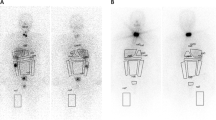Abstract
The biological elimination of therapeutic131I in patients with differentiated thyroid cancer (DTC), post total or near-total thyroidectomy, was compared after withholding levothyroxine suppression against administration of recombinant human thyrotropin without stopping levothyroxine. In 163 patients (group G1) levothyroxine was withheld before131I therapy: in 138 patients the tumor was limited to the thyroid bed (group G1.1) and in 25 patients metastases were present (group G1.2). A second group of patients (G2; n = 28) received131I therapy after administration of recombinant human thyrotropin without stopping levothyroxine. Mean retained131I activity (as a percentage of the administered dose) was 5%-29% (group G1.1), 20%-43% (group G1.2) and 1 %-17% (group G2). The effective half-life of131I was 0.59-0.69 days (group G1.1), 0.87-1.22 days (group G1.2) and 0.38-0.44 days (group G2). In conclusion, the use of recombinant human thyrotropin to prepare patients with thyroid cancer for therapy with131I shortens its effective half-life and reduces its retained activity compared to preparation with discontinuation of levothyroxine suppression.
Similar content being viewed by others
References
NRC. U.S. Nuclear Regulatory Commission 1997 Criteria for the release of individuals administered radioactive materials-NRC, Final rule.Fed Regist 1997; 62: 4120–4133.
ICRP. International Commission on Radiological Protection Radiation Dose to Patients from Radiopharmaceuticals, ICRP Publication No. 53. Elmsford, NY; Pergamon Press, 1987.
Papadimitriou D, Oros L, Manetou A, Perris A, Molfetas M, Kottou S. Exposure rates (versus time after administration) in relation with clinical factors for thyroid carcinoma patients treated with iodine-131. European IRPA Congress 2002. Florence, Italy, October 8–11, 2002.
Serafini A, Clauss R, Levis-Dusseau S. tProtocol for the combined diagnostic and therapeutic use of recombinant human thyroid—stimulating hormone.Clin Nucl Med 2003;28: 14–17.
Lippi F, Capezzone M, Angelini F, Taddei D, Molinaro E, Pinchera A, et al. Radioiodine treatment of metastatic differentiated thyroid cancer in patients on I-thyroxine, using recombinant human TSH.Eur J Endocrinol 2001;144:5–11.
Luster M, Lassman M, Haenscheid H, Michalowski U, Incerti C, Reiners C. tUse of recombinant human thyrotropin before radioiodine therapy in patients with advanced differentiated thyroid carcinoma.J Clin Endocrinol Metab 2000;85: 3640–3645.
Vitale G, Lupoli GA, Ciccarelli A, Fonderico F, Klain M, Squame G, et al. The use of recombinant human TSH in the follow-up of differentiated thyroid cancer: experience from a large patient cohort in a single centre.Clin Endocrinol 2002; 56: 247–252.
Emerson CH, Torres MS. Recombinant human thyroid-stimulating hormone: pharmacology, clinical applications and potential uses.BioDrugs 2003; 17: 19–38.
Schlumberger MJ, Incerti C, Pacini F, Reiners C. tThe role of recombinant thyroid-stimulating hormone (rhTSH) in the detection and management of well-differentiated thyroid carcinoma: a roundtable discussion.J Endocrinol Invest 1999; 22 (11 suppl): 35–41.
Dow KH, Ferrell BR, Anello C. tQuality of life changes in patients with thyroid cancer after withdrawal of thyroid hormone therapy.Thyroid 1977; 7: 613–619.
Klein I, Ojamaa K. tThyroid hormone and the cardiovascular system.N Engl J Med 2001; 344: 501–509.
Euratom Commission Radiation Protection. Radiation protection following iodine-131 therapy. Exposures due to outpatients or discharged inpatients. Luxemburg; Directorate General, Environment, Nuclear Safety and Clinical Protection, 1998.
Schlumberger M, Pacini F.Differentiated thyroid carcinoma. Paris; Nucleon, 1999: 85–105.
Stabin MG, Watson EE, Marcus CS, Salk RD. Radiation Dosimetry for the Adult Female and Fetus from Iodine-131 Administration in Hyperthyroidism.J Nucl Med 1991; 32:808–813.
Venencia CD, Germanier AG, Bustos SR, Giovannini AA, Wyse EP. Hospital discharge of patients with thyroid carcinoma treated with131l.J Nucl Med 2002; 43: 61–65.
North DL, Shearer DR, Hennessey JV, Donovan GL. Effective half-life of131I in thyroid cancer patients.Health Phys 2001;81:325–329.
Hennessey J, Kreisman S. tConsistent reversible elevations of serum Creatinine levels in severe hypothyroidism.Arch Intern Med 1999; 159: 79–82.
De Keizer B, Barns B, Hoekstra A, Zelissen P, Koppeschaar H, Lips C, et al. Tumour dosimetry and response in patients with metastatic differentiated thyroid cancer using recombinant human thyrotropin before radioiodine therapy.Eur J Nucl Med Molecular Imaging 2003; 30: 367–373.
Maxon HR, Thomas SR, Hertzberg VS, Kereiakes JG, Chen IW, Sperling MI, et al. Relation between effective radiation dose and outcome of radioiodine therapy for thyroid cancer.N Engl J Med 1983; 309: 937–941.
Park SG, Reynolds JC, Brucker-Davis F. tIodine kinetics during 1-131 scanning in patients with thyroid cancer: comparison of studies with recombinant human TSH (rhTSH) vs hypothyroidism.J Nucl Med 1996; 37 (suppl 1):15.
Goslings BM. Effect of a low iodine diet on 131-1 therapy in follicular thyroid carcinomata.J Endocrinol 1975; 64:30P.
Luster M, Lippi F, Jarzab B, Perros P, Lassmann M, Reiners C, et al. rhTSH-aided radioiodine ablation and treatment of differentiated thyroid carcinoma: a comprehensive review.Endocr Relat Cancer 2005; 12: 49–64.
Author information
Authors and Affiliations
Corresponding author
Rights and permissions
About this article
Cite this article
Papadimitriou, D., Kottou, S., Oros, L. et al. Differentiated thyroid cancer: comparison of therapeutic iodine 131 biological elimination after discontinuation of levothyroxine versus administration of recombinant human thyrotropin. Ann Nucl Med 20, 63–67 (2006). https://doi.org/10.1007/BF02985593
Received:
Accepted:
Issue Date:
DOI: https://doi.org/10.1007/BF02985593




